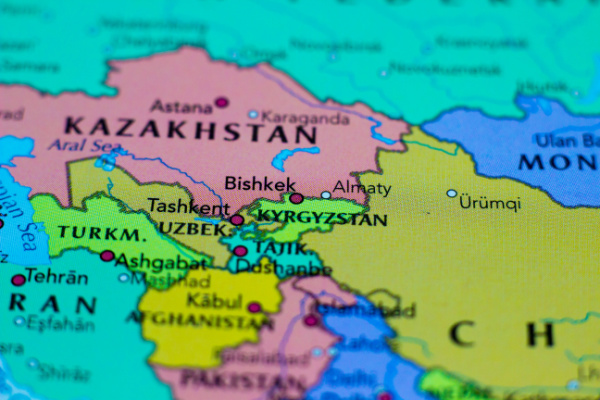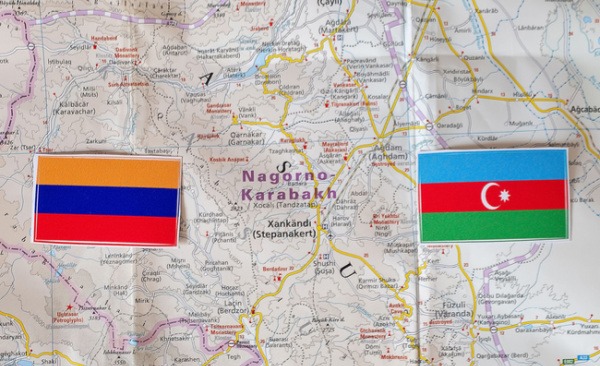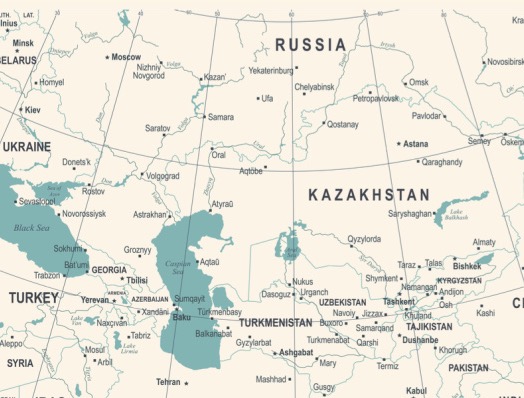How Washington can Reconnect With Central Asia
By Stephen Blank
As a second Trump Administration takes power it is worth inquiring of its future policies towards Central Asia and the Caucasus. While neither region is likely to be a priority of U.S. policy, both offer Washington numerous opportunities to advance its interests, vis-à-vis the regional states as well as the larger actors bordering them, most prominently Russia, China, and Iran. If the incoming administration adheres to the framework that Trump’s first team propounded of this being an era framed by great power competition, it may indeed come to see the value of upgrading U.S. policy towards these countries. Across Central Asia and in the Caucasus, particularly among the Georgian population now rising against its government, and in Armenia, a stronger U.S. profile would certainly be welcome.

BACKGROUND: For Washington to fully benefit from enhanced relations with the governments of Central Asia and the Caucasus, it must acknowledge and adapt to the current regional realities. These regions have transformed significantly over the past generation, necessitating a rethinking of U.S. engagement strategies.
First, it is imperative to recognize that Central Asian states, as well as Russia and China, have come to terms with the Taliban’s control of Afghanistan and now consider Afghanistan an integral part of Central Asia. Despite Washington’s current reluctance to adopt a similar stance, advancing economic and political engagement with Central Asia and the Caucasus creates a foundation for future dialogues involving Afghanistan. These engagements would prepare the groundwork for meaningful regional discussions and collaborations when conditions become favorable.
Second, Azerbaijan is rapidly emerging as a key player in Central Asia. President Aliyev is frequently invited to and actively participates in regional presidential summits and Azerbaijan takes full part in significant regional economic, trade, and transportation initiatives. These projects, either in progress or under serious consideration, underscore Azerbaijan’s importance in shaping the region’s geopolitical and economic landscape. Consequently, any effective U.S. policy towards the Caucasus or Central Asia must account for these evolving regional dynamics. Recognizing and leveraging the interconnectedness between these regions will allow the U.S. to engage more effectively and with greater agility in advancing its strategic interests.
U.S. policymakers must also rethink both regions in a broader context. Central Asia and the Caucasus have established lasting inter-regional connections and ties to major global actors, including Turkey, Iran, India, South Korea, and Japan, alongside Russia and China. On economic grounds alone, Washington should increase its presence through trade, investment, environmental initiatives, and security cooperation, especially as the European Bank for Reconstruction and Development forecasts robust growth for these states. Wider U.S. engagement is needed in contrast to its neglect for the region during the Afghanistan war—when U.S. policy was narrowly focused—and subsequent disengagement after Afghanistan fell to the Taliban.
Continued U.S. and Western inattention gives Moscow and Beijing opportunities to solidify hegemonic influence, despite local governments’ explicit preference for multivector foreign policies. While the Biden Administration accepted Kazakhstan’s 5+1 presidential summit, this event has not become a recurring engagement, nor have there been significant high-level visits. Initiatives like the Economic Resilience in Central Asia (ERICEN) program are underfunded and lack alignment with an overarching strategy. This pattern of inadequate resources and strategic disconnect has long characterized U.S. initiatives in the region.
Similarly, strategy documents, such as the Trump Administration’s Central Asia Strategy to 2025, have achieved little, reflecting a lack of both intellectual and institutional commitment to the strategic importance of these regions. This is further evidenced by the absence of a strong U.S. response to Russian interference in Georgia, minimal involvement in the Armenia-Azerbaijan peace process, and the overall lack of a comprehensive strategy for Central Asia. Such bipartisan neglect highlights the critical need for a reformed and proactive approach to U.S. policy in the region.
IMPLICATIONS: To reverse this record of failure, the new administration must rethink its approach to these regions, recognizing their growing linkages and the potential of regional and international cooperation. Such collaboration will strengthen these states’ independence from Beijing and Moscow, aligning with vital U.S. interests. However, this objective requires large-scale institutional reform.
The State Department, Pentagon, and the National Security Council should establish a dedicated structure for Caucasus and Central Asian affairs. At the State Department, this would involve appointing an Assistant Secretary of State to oversee this portfolio, to whom the corresponding country desks report directly. In turn, he or she can report directly to the Under Secretary, Secretary of State, their opposite numbers at the Pentagon, and the White House at the National Security Council. Such a structure would elevate these regions’ importance in policymaking and provide the president with a more transparent and effective process for addressing issues in Central Asia and the Caucasus.
This reorganization would enable an integrated “whole-of-state” approach, ensuring that that U.S. policies align with its strategic interests and that regional voices are heard. It also allows the U.S. government to conduct policies towards these areas based on its interests rather than on the values of junior bureaucrats as in the State Department’s Bureau of Labor and Democracy. Its members previously boasted that they were going to impose democracy on Central Asian states and achieved merely an ignominious failure. They failed because they refused to take into account that every one of these governments has alternatives to Washington and factions within them who lean towards Moscow and Beijing. Therefore, in the absence of sustained U.S. engagement, all that these lectures achieved was increased anti-American resentment and a turn to other powers who took these states as they are. This outcome is visible in U.S. relations with Azerbaijan, which has many other patrons and several pro-Russian figures in its government. Baku spurned Congressional and Administration demands for democratization and subsequently moved closer to Russian policy. Undoubtedly, they saw these demands as moves initiated by this bureau and the Armenian lobby who influenced Congress in the absence of any coherent U.S. strategy.
Structural and intellectual reorganization will allow Washington to engage strategically and consistently with regional governments. By connecting democratization efforts with significant economic, political, and defense projects, these governments will find it harder to forgo the benefits of cooperation. Additionally, this structure minimizes the
influence of single-interest Congressional lobbies by emphasizing comprehensive and strategic policies. As Central Asia and the Caucasus gain prominence, increased administrative capability will enable better collaboration with Congress to shape balanced and forward-looking strategies. A proactive, strategic approach will not only enhance U.S. influence but also support the independence and development of Central Asia and the Caucasus. Addressing the importance of these regions in U.S. policymaking is critical to securing long-term stability and countering hegemonic ambitions by other powers.
CONCLUSIONS: The opportunities of the future and lessons from the past are unmistakable. Previous U.S. policies failed for reasons detailed in academic and professional literature. However, the Trump administration has a chance to respond to the region’s desire for enhanced U.S. economic, political, and military cooperation. Possibly excepting the pro-Moscow Georgian government, every state in the region seeks greater U.S. engagement, albeit on their terms.
This desire signifies a positive development that Washington should support by implementing the structural and policy changes outlined here. These adjustments would bolster the independence of Central Asia and the Caucasus and facilitate their cooperation with international institutions to spur regional development. This progress would empower these states to shape their futures independently, and not according to the wishes of Moscow or Beijing.
Failure to seize these opportunities and continuing inaction will leave these regions vulnerable to becoming backward, conflict-ridden dependents of Russia and China. The new generation, more aligned with Western values, may lose its chance for a brighter future. Rather than becoming stable regions fostering global cooperation, Central Asia and the Caucasus risk devolving into conflict zones where international rivalries escalate.
The U.S. must act decisively to prevent such an outcome. By prioritizing these regions and adopting a proactive strategy, Washington can mitigate great power competition and avert prolonged instability across Eurasia. The stakes are too high to ignore the transformative potential of effective engagement in Central Asia and the Caucasus.
AUTHOR’S BIO: Stephen Blank is a Senior Fellow with the Foreign Policy Research Institute, www.fpri.org.
Georgia’s Aborted EU Accession: A Political Crisis
By Laura Linderman
On November 28, 2024, the ruling Georgian Dream (GD) party explicitly announced a change in Georgia's foreign policy trajectory, despite overwhelming public opposition to turning away from European integration. Prime Minister Irakli Kobakhidze declared the party's decision to halt EU accession negotiations, rejecting talks until 2028 and refusing EU budget support. Kobakhidze asserted that Georgia would enter the EU in 2030, "with dignity" - a claim rejected by the vast majority of Georgians who view this as a betrayal of the country's pro-European aspirations.
This decision sparked nationwide protests that reflect the broad public consensus in support of European integration. Demonstrators have gathered in Tbilisi, Batumi, and cities across Georgia, condemning GD's decision and the subsequent police brutality against mostly peaceful protesters. Demonstrations have continued since the announcement, with protesters blocking streets, clashing with riot police, and facing dispersal attempts using water cannons, tear gas, and pepper spray. President Salome Zourabichvili has pledged to stay on as Georgian President, emphasizing that the illegitimate Parliament cannot elect a legitimate President.

BACKGROUND: Prior to the October 26, 2024, parliamentary elections, Georgia's economy was experiencing double-digit economic growth, despite the fact that most ordinary Georgians live near poverty. This growth was fueled, in part, by financial flows from Russia, including tourism, trade, and potentially sanctions-evading investment. Russia is a significant market for Georgian products like wine, and the influx of Russian money had created a wealthy elite dependent on these financial flows. The economic growth figures helped the Georgian Dream (GD) secure support and acquiescence from some segments of the population.
This dependence on Russian money creates a conflict between Georgia's political aspirations of joining Europe and its economic realities. Despite preferential access to the EU market, Georgia did not produce much that Europe wanted to buy, while Russia was a major consumer of Georgian products. This economic reality, coupled with GD's close ties to Russia, likely contributed to the party's decision to halt EU accession negotiations, further consolidating its grip on power and jeopardizing Georgia's European future.
The protests that followed Georgian Dream's decision to suspend EU accession negotiations were fueled by a strong desire for EU integration among a distinct majority of the Georgian population. While the GD government maintained its rhetoric about commitment to eventual EU membership, its decision to postpone accession talks until 2028 provoked immediate public anger and confirmed long-standing suspicions that the government lacked genuine commitment to EU integration. The government's ratification of a Russian-style "foreign agents" law over the summer, coupled with its strategic courting of older, rural conservative constituencies more vulnerable to fears of cultural upheaval and potential conflict with Russia, further reinforced the perception that GD was prioritizing appeasement and political expediency over meaningful European alignment.
The timing of the announcement coincided with a European Parliament resolution documenting electoral irregularities. This resolution echoed widespread criticism of the elections, which were marred by concerns about the secrecy of the vote, vote-rigging, voter intimidation, and a lack of transparency, as reported by international observers. GD's decision, perceived by many as a rejection of the popular will in favor of closer ties with Russia, led to a significant portion of the population demanding immediate progress toward EU membership.
IMPLICATIONS: Since the November 28th announcement, numerous civil servants have resigned in protest, including Georgia's ambassadors to the United States, Lithuania, Bulgaria, Italy, Czechia, and the Netherlands. The Baltic states of Lithuania, Estonia, and Latvia imposed sanctions on GD founder Bidzina Ivanishvili and several high-ranking Interior Ministry officials, barring them from entering their countries. The Baltic states also condemned the suppression of protests and reaffirmed their support for the Georgian people's European aspirations. In addition to these resignations and sanctions, various sectors of Georgian society mobilized in opposition to the GD's decision. Students from universities organized marches and protests, demanding a reversal of the decision and calling on their universities to suspend classes so students could participate in demonstrations. The Georgian Trade Unions Confederation criticized GD's lack of transparency and condemned police violence against protesters. The International Chamber of Commerce in Georgia warned that halting the EU accession process would negatively impact the country's economy and investor confidence. Both major banks, Bank of Georgia and TBC Bank, and leading internet providers Magti and Silknet condemned the government's actions and reaffirmed their commitment to European integration.
The implications of GD’s decision and the subsequent protests are multifaceted and far-reaching:
-
Erosion of Democracy: GD’s actions, including the alleged election rigging and violent suppression of protests, have significantly damaged Georgia’s democratic credentials. International observers have expressed concerns about the erosion of democratic norms and the shrinking space for civil society in Georgia, especially the ratification of the Russian-style foreign agents law. The use of excessive force against protesters, including journalists, further highlighted the government's disregard for fundamental freedoms.
-
Strained EU Relations: The decision to halt EU accession has severely strained Georgia’s relationship with the EU. European officials have condemned GD's move as a betrayal of the Georgian people’s aspirations and a rejection of the country's European future. The suspension of EU budget support and the potential for sanctions against GD leaders further isolate Georgia from its European partners.
-
Strained US Relations: The US decision to suspend its Strategic Partnership with Georgia, in response to GD's halt of EU accession negotiations, signals a deterioration in US-Georgia relations and underscores US concerns about GD government's commitment to democratic values and the rule of law. By suspending the partnership, the US aims to pressure the Georgian government to reconsider its actions and to demonstrate its commitment to democratic principles. The suspension also raises questions about the future of US assistance to Georgia, which has been instrumental in supporting the country's democratic and economic development. This move could weaken Georgia's security and stability, particularly in the context of ongoing tensions with Russia. Additionally, it may embolden anti-Western forces within Georgia and undermine the pro-European aspirations of the Georgian people
-
Geopolitical Realignment and Russian Influence: The timing of Russian President Vladimir Putin's praise for GD's decision, just minutes after the announcement, has raised suspicions about potential Russian influence behind the move. The sources also highlight GD's adoption of policies, such as the "foreign agent" law, that mirror Russian legislation and have been criticized by the EU and the US.
-
Implications for Regional Stability: The potential geopolitical realignment of Georgia has significant implications for the balance of power in the South Caucasus. A shift towards Russia could embolden the Kremlin to exert more influence in the region and potentially threaten the sovereignty of other neighboring countries, particularly Armenia.
-
Economic Fallout: The halting of EU accession has created significant economic uncertainty for Georgia. The potential for reduced foreign investment and trade disruptions could severely impact the country's economic growth. While Georgia's recent economic growth has been partly fueled by Russian money, this raises concerns about economic sustainability and potential dependence on Russia. The Georgian Dream (GD) party's rejection of EU budget support will limit financial assistance and hinder development. GD's actions have damaged Georgia's international reputation and risk international isolation. Widespread protests, including strikes by schools and universities, are disrupting economic activity and further undermining investor confidence. The ongoing political instability threatens to derail Georgia's economic progress and international standing.
CONCLUSION: GD's decision to halt EU accession has triggered a nationwide crisis, revealing a stark disconnect between the ruling party and the overwhelming pro-European sentiments of Georgian citizens. While GD claims to be pursuing a "European path with dignity," its actions suggest a shift towards Russia's sphere of influence, raising concerns about the country's sovereignty and democratic future. This shift is motivated, in part, by a strategic calculation that aligns with the interests of certain political and economic elites within Georgia, who have benefitted from closer ties with Russia and favor an appeasement strategy with the North. GD has employed a range of tactics to consolidate its power, including manipulating elections, intimidating voters, and suppressing dissent, drawing parallels to the authoritarian playbook seen in countries like Hungary. The opposition's struggle to counter GD's narrative and mobilize sustained public resistance highlights the challenges facing pro-democracy forces in Georgia.
AUTHOR BIO: Laura Linderman is a Senior Fellow and Director of Programs at the Central Asia-Caucasus Institute of the American Foreign Policy Council.
A New Spring for Caspian Transit and Trade
Svante E. Cornell and Brenda Shaffer
October 17, 2023
Major recent shifts, starting with the Taliban victory in Afghanistan and Russia’s war in Ukraine have led to a resurgence of the Trans-Caspian transportation corridor. This corridor, envisioned in the 1990s, has been slow to come to fruition, but has now suddenly found much- needed support. The obstacles to a rapid expansion of the corridor’s capacity are nevertheless considerable, given the underinvestment in its capacity over many years.

Is it America’s Hour in the Caucasus?
By Stephen Blank
July 10, 2023
On May 4 Secretary of State Blinken announced that the negotiations between Armenia and Azerbaijan had made progress and that an agreement that would terminate the thirty-year war over Nagorno-Karabakh was “within reach.” While much more negotiation is obviously necessary and will be difficult, this announcement, if true, is an epochal one whose ramifications spread from Europe to the Middle East and Central Asia. It also reflects the fact that security in the Caucasus cannot be considered separately from a discussion of international order in those three regions. If Washington can broker or mediate an end to this war it, with the support of the EU whose prior initiative has been the basis for its approach, will become the primary foreign power and even possibly security manager in the Caucasus.

Russia's Weakened Influence in Central Asia and the Caucasus
By Alexander Yeo and Emil Souleimanov
July 6, 2023
Russia has long been a regional hegemon, able to actively exert hard and soft power over many of its neighbors, the Central Asian and South Caucasian states among them. However, since the start of Russia’s full-scale invasion of Ukraine, this influence has weakened, with military and economic resources being diverted to an increasingly protracted and unpredictable war effort. This has led to a shift in regional power balances, as showcased by Azerbaijan’s ascendancy in the South Caucasus, as well as economic challenges including the difficult choices faced by the allies of an increasingly isolated Russia.



